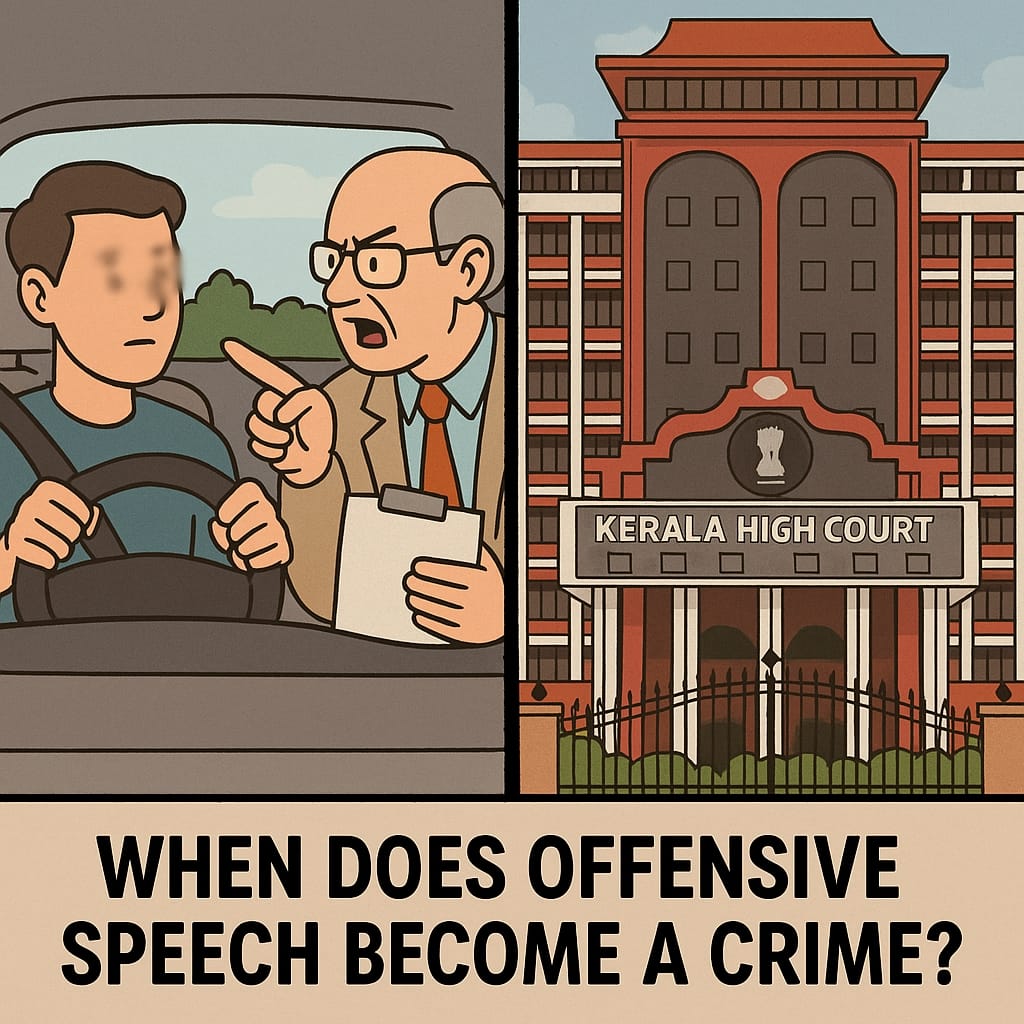The Kerala High Court, on Aug, 2025, delivered a ruling that contained fresh nuance to India’s interpretation of “obscenity” and “insulting the modesty of a woman” under the Indian Penal Code (IPC). The case, majorly revolved around a Motor Vehicle Inspector’s verbal remark during a test drive and it raised important concern about where free expression ends and where criminal liability begins.
In October 2022, a woman showed up for her driving test in Nedumangad, Thiruvananthapuram. During the test, the inspector in charge, Anas Mohammed M, allegedly made remarks she found deeply insulting.
According to her complaint, he commented that her long nails might give him a septic infection and even went so far as to suggest he could trim them himself. He went further, making sweeping remarks about women’s hygiene and claiming that those who do not bathe, brush, or trim their nails are “offspring of immoral ladies.” He allegedly addressed the complainant directly as “the daughter of an immoral lady.”
The remarks, recorded and later detailed in the complaint, were seen by the complainant as public humiliation and a targeted insult based on her gender.
Accusations
After this incident, the woman filed a complaint under the following provisions of IPC:
Section 294(b), IPC – Punishment for obscenity either by words or acts at Public Place.
Section 509, IPC – Criminalize the use of words, gestures, or actions aimed at insulting a woman’s modesty.
The case was initially presented to the Judicial Magistrate Court-II in Nedumangad. In Oct 2024, the inspector argued that although his comments may have been offensive, they did not legally qualify as an offence of obscenity . The magistrate denied his request which led me to knock on the doors of higher court.
The Court’s Reasoning
Justice G. Girish, carefully Observed :
Section 509 – “Insulting a Woman’s Modesty through Actions or Gestures”
To establish this offense, there must be clear intent to harm the modesty of woman’s and that too in sexual manner.
The Court referenced recent Supreme Court rulings—such as Madhushree Datta v. State of Karnataka (2025)—which clarified that Section 509 of the IPC does not encompass every inappropriate or offensive remark.
The Judgment
The High Court of Kerala quashed the case by reversing the magistrate’s decision.
Judgment
The High Court of Kerala dismissed the case and reversed the magistrate’s decision by stating that the act can only become offence when all the necessary components of the legal provision are satisfied, and not simply because the behavior is objectionable or socially frowned upon.
The ruling asserted:
“Insulting or offensive remarks, without any sexual intent, cannot be manipulated to fit the criteria of Section 509. Likewise, Section 294(b) requires obscenity and a public context, both of which are lacking in this case.”
Criticism
Women’s rights supporters might say that verbal humiliation at work can leave deep emotional scars, even if it’s not sexual in nature, and that the law should deal with such behaviour more firmly. On the flip side, free speech advocates and strict interpreters of criminal law might see this ruling as an important check against turning every offensive comment into a criminal case.
Conclusion
The Anas Mohammed M case has shown how beautifully Indian courts have carved out the difference between right and duty. While some may view the Kerala High Court’s decision as soft, even the judiciary cannot surpass what is written in the statute.
At the end, the case brought out a harsh truth that the law can punish only what it clearly defines whereas, decency and respect in today’s society demand more than just staying on the right side of offence.
About the Author:
Sarika, an alumnus of Mody University of Science & Technology, Rajasthan is an ardent learner having keen interest in Constitutional and Criminal Law. Through her academic journey and hands-on legal experience, she has developed a strong interest in legal research, policy analysis, and illustration.

